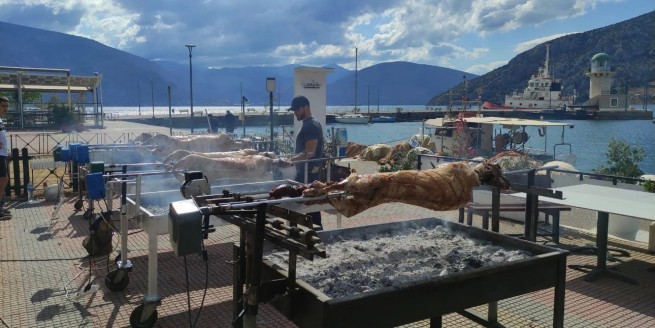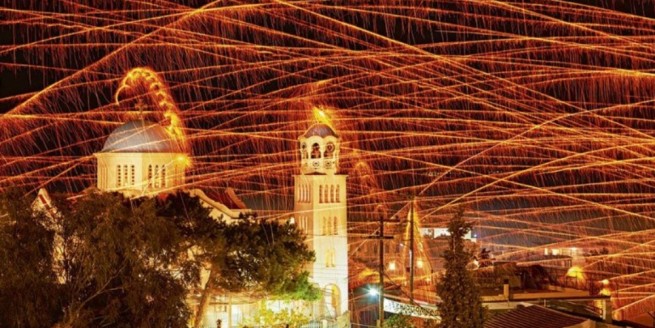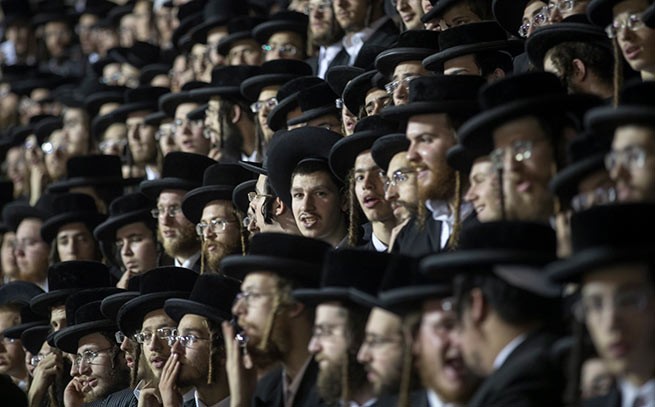In the midst of the war with Hamas, expected changes in the military exemption of ultra-Orthodox Jews are causing severe social and political upheaval.
As the war in the Gaza Strip approaches the dark mark of its first six months, the initial spirit of national unity in Israel is dissipating. And it's not just anger over the Netanyahu government's failure to prevent the October 7 Hamas attack. Or for the tactics of delaying negotiations on a ceasefire and the release of hostages.
Anti-government demonstrations, which are growing in number and calling for immediate elections, are now also dominated by an issue that has long divided Israeli society but becomes toxic in wartime. The broad exemption of ultra-Orthodox Jews from compulsory military service is reopening a deep rift in Israel and causing friction in the ruling coalition.
In practice, these exceptions have been in place since the founding of the State of Israel in 1948, a country where men and women, with the exception of those of Arab origin, are required to serve in the army. All are also automatically excluded Haredi women – the so-called ultra-Orthodox Jews – and all the men of this community, devoted themselves to the study of the sacred texts of Judaism.
However, in the midst of the current war, pressure from the secular part of Israeli society is intensifying. Not so much for its termination, but for the abolition of special exceptions, while on the war fronts Even reservists from the Jewish Diaspora are called up.
On this issue, on which various legislative measures were taken from time to time, but many of them remained on paper, appeals were filed to the Supreme Court of the country on the basis of the principle of equality of citizens. With an extended measure exempting haredim from military conscription set to expire at the end of March, the judges ordered the Israeli government to submit a new bill by the deadline. However, this deadline passed to no avail due to numerous internal government tensions.
An eye for an eye
Ultra-Orthodox parties in Benjamin Netanyahu's religious-nationalist government have not raised the issue. They even threaten to abandon it if radical changes are made to exempt haredim from compulsory military service. The centrist secular National Unity Party led by Benny Gantz, which switched from opposition to government at the height of the war due to extraordinary circumstances, is drawing its own red lines.
Gantz, a popular former chief of staff and current member of Israel's military council, is pushing for major changes to conscription exemptions. Defense Minister Yoav Galad, a member of the ruling right-wing Likud party, shares the same opinion. “I think the problem can be solved,” the Israeli prime minister said shortly before the deadline.
He claimed that his government was already working intensively on this issue before the war began. “We must promote equality,” he added, while Arab citizens of Israeli origin are treated as B citizens.
As for ultra-Orthodox Jews, “this can be done in a positive spirit and with broad consensus,” Netanyahu said. He even praised the Haredis' “sincere desire for compromise,” saying he was optimistic that the new law would be passed by June 30, according to the timetable set for it.
Many doubt this will happen
As a means of pressure, the Supreme Court issued an interim order canceling all government grants to those seminarians who do not respond to recruitment notices. This measure came into force on April 1. In the meantime, in a legal vacuum, the army can immediately begin conscripting those Haredis who took advantage of the exemption from conscription during the six months of the war. According to Israeli media, there are more than 66,000 people between the ages of 18 and 26. During the same period, the number of those who decided to enlist in the army barely reached 540.
Old traditions, new problems
In contrast to modern values and practices, ultra-Orthodox Jews are distinguished by their strict adherence to Jewish law and tradition. As a result, they are separated from the rest of society. They believe that the responsibility of yeshiva students is the “spiritual protection of the Jewish people,” and that the Israeli army is contrary to their way of life, for example because it recruits women or because serving in it makes it difficult to observe the Sabbath and other Jewish customs.
It was on the basis of these arguments that the exemption of haredis from compulsory military service was initially permitted in 1948. At that time, their community numbered 40,000 people, representing 5% of Israel's population. However, today this figure has risen to 13.5% due to the high birth rate within their ranks. Haredi women give birth to an average of 6.5 children, compared to 2.5 in the rest of Israel. According to the Israeli Bureau of Statistics, by 2065, ultra-Orthodox Jews will make up 32% of the country's population.
Currently, it is estimated that about 13,000 Haredi men approach the conscription age of 18 each year. However, according to the State Control Committee of the Knesset (Israeli parliament), which recently held hearings on this issue, less than 10% are conscripted into the army. On the contrary, the number of students in yeshivas is the highest in history.
Yet nearly half of ultra-Orthodox Jews in Israel live on government benefits and tax breaks without being integrated into the country's workforce. About a third are below the poverty line. Economists note that such a system is no longer sustainable. “Unless significant changes occur, ultra-Orthodox society will collapse economically,” said Dr. Rivka Neria Ben-Sahar, a senior fellow at the Israel Democracy Institute, in an article in Haaretz.
Facing critical dilemmas
A recent poll showed that 70% of Israeli citizens oppose the continuation of the current situation, especially the exemption of haredis from military service. Beyond social cohesion, the issue now threatens Netanyahu's current government, which has called up a total of 287,000 reservists in the first six months of the war with Hamas and is pushing for longer military service.
“We would rather die than serve in the Israeli army” said the 42-year-old Haredi father of 11 children and a seminary student who took part in a demonstration protesting plans for conscription. One of the country's two chief rabbis, Yitzhak Yosef, has threatened that Haredis “will all move abroad” if they are forced to serve in the army.
Similar comments have been made in the past. However, at the height of the war, they attracted widespread condemnation, as well as many ironic comments, since many secular Israelis would not have objected to such a prospect.
According to Gilad Malach, director of the Ultra-Orthodox in Israel program at the Institute for Democracy, the attitude of the leadership of ultra-Orthodox Jews has further alienated society from them. “With this government, I don’t see any real opportunity for change,” he emphasizes. “But it could happen,” he added, “if elections are held and a coalition is created without the ultra-Orthodox parties or with their influence weakened.”
For now, Netanyahu, who is fighting for political survival after being accused of corruption, has ruled out the possibility of early voting. Nevertheless, “this issue is one of the most obvious political threats to the government,” Gilad Malakh emphasized.
Authoritative analyst Nahum Barnea summed up the situation even more succinctly. “A complete exclusion for the ultra-Orthodox,” he wrote in the Israeli newspaper Yediot Aharonot, “creates a personnel problem for the army, a political problem for Netanyahu and an ideological problem for Jewish society.”







More Stories
Israel launched a missile attack on a facility in Iran, what is known at this hour
Collective West to Israel: “Repelling Iranian attacks is too expensive for us”
Iran attack on Israel